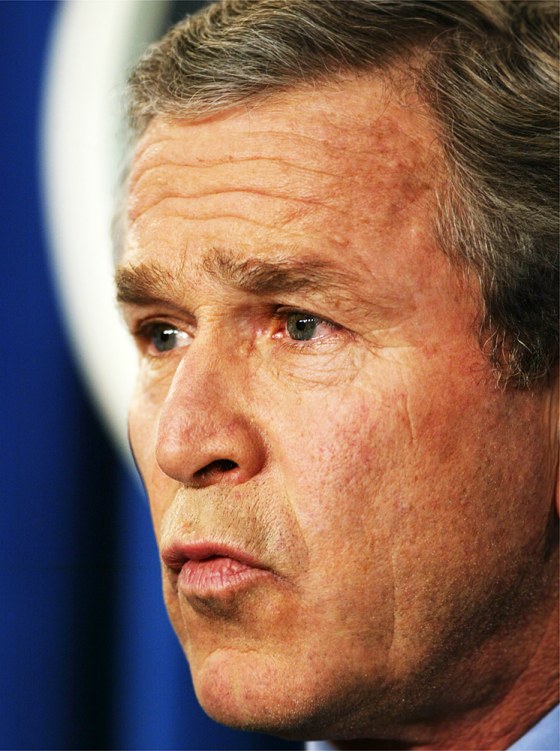A modest domestic agenda, staying the course in Iraq and plenty of politicking will dominate the White House agenda for 2004. And on Capitol Hill, lawmakers will have a full plate of -- including, for many, the task of positioning themselves for another run for Congress.
For President Bush, the number one political priority will be winning re-election.
"They are going to point with pride to accomplishments of the past three years," said Karlyn Bowman at the American Enterprise Institute, a list that includes "education, tax cuts, homeland security, and the Medicare drug benefit."
At his year-end press conference earlier this month, the president outlined a modest wish list for '04.
"What I've been referring to, in terms of pro-growth, are an energy bill, good tort reform coming out of the Congress," he told reporters. "We need more regulatory relief. We certainly need to send a signal to the capital markets that we're going to maintain spending discipline."
Bush is expected to push for changes to Social Security, most importantly to allow individual retirement accounts under the system.
"It will be controversial but personal retirement accounts, according to all the polls, have the support of the majority, and strong support among the young," said Bowman. "So Social Security used to be thought of as the third rail of American politics, and I think in another five years not reforming Social Security could be the third rail of American politics -- touch it and die."
The signature issue of the first three Bush years -- big tax cuts -- seems to be off the table in 04.
"You rarely see a Republican president who doesn't love a tax cut, and there's plenty of reform in the tax cut ahead," said Stephen Hess at the Brookings Institution. "But at the moment he has some very costly work to be done in Iraq and Afghanistan."
Bush's foreign policy focus will be on turning over political control of Iraq to Iraqis and beginning U.S. troop withdrawals by next summer — Provided the anti-American insurgency doesn't spiral out of control.
Bush could also spring some out-of-this-world ideas; the president's aides are reportedly considering whether he should call for a return trip to the moon -- or even a mission to Mars.
ON CAPITOL HILL
When lawmakers return to the Hill next month, their list of New Year's resolutions will be long. But like everyone else's, they will likely be hard to keep.
"The impetus for major legislation isn't there in a presidential election year," said Norman Ornstein at the American Enterprise Institute. "First, the year is short and people are distracted. Secondly, lots of people before they commit to sweeping legislation want to see whether they might get a better deal depending on who wins the election the next time around."
Yes, it's time for much of Congress to run for Congress again. And that means those in the minority will be pounding on those in the majority, as they all pound the pavement for votes. In fact, it's already begun, with Senate Minority leader Tom Daschle recently leading the charge.
"The American people will not tolerate another year of missed opportunities like this one, nor should they!" he said.
Those opportunities include energy and a comprehensive bill to overhaul a national power grid that has already shown it's lack of mettle. That will undoubtedly top the new list and perhaps a pared down version could make it through.
But what about tort reform? Asbestos? Class action? How about fixing the nation's bankrupt pensions? And that little trade problem we have with the World Trade Organization, which could start costing the U.S. $4 billion dollars a year in sanctions?
"In this upcoming year it's unlikely that you'll get significant tort reform, that you'll get asbestos reform," said Greg Valliere, managing director of Charles Swabb Research.
That's because partisan tempers are running high. And passing legislation is not always fiscally prudent for a politician on the ballot, said Ornstein.
"If you resolve a big issue, then it's gone, then next time around you don't have that same level of intensity out in the corporate community," he said. "So oftentimes you have a game played in Congress of raising an issue and letting it string out for a sizeable period of time, getting people all whipped up and letting the contributions come in over and over again."
Campaign finance reform may be fully installed, but that doesn't mean corporate donations won't find their way up the Hill and into the pipelines that fuel their interests.
"Next year could be a cynics dream," said Valliere. "It could re-enforce a lot of cynicism about how things get done in Washington. Because I think you will get pension reform, (which is) very important to a lot of companies. I think you will get reform of foreign tax subsidies, also very important to our major multi-national corporations."
Of course it's impossible, given all the factors weighing on Washington in a presidential election year, to predict what will and won't happen, especially since Bush has yet to indicate what his focus will be on Capitol Hill. As we saw with tax cuts and Medicare, while he may have only slim majorities in both houses, he still carries plenty of weight.
